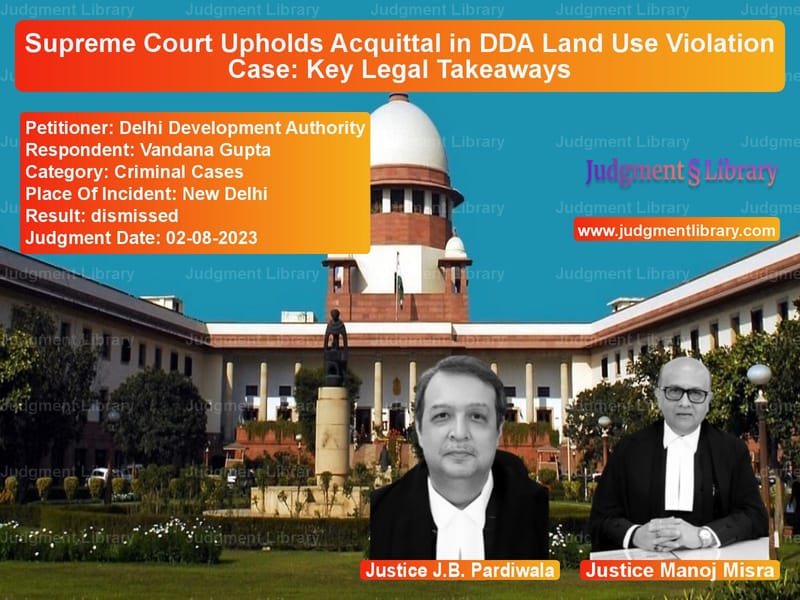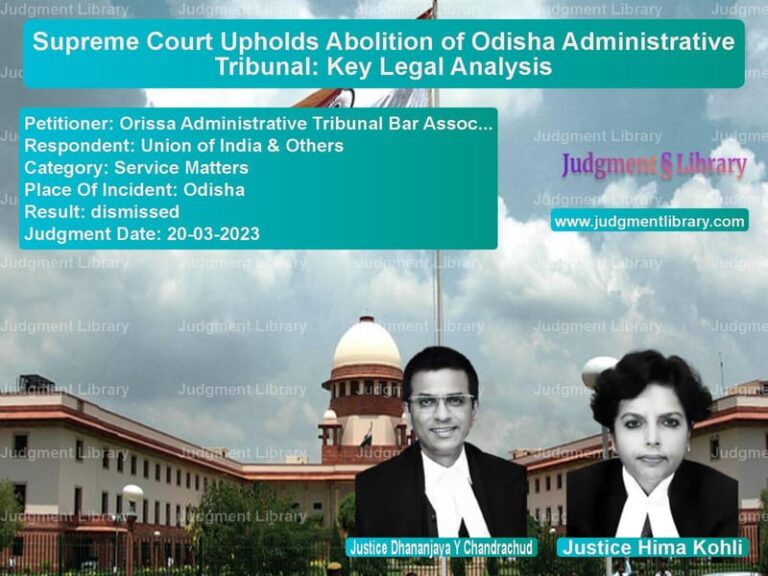Supreme Court Upholds Acquittal in DDA Land Use Violation Case: Key Legal Takeaways
The Supreme Court of India recently delivered an important judgment in the case of Delhi Development Authority vs. Vandana Gupta. The Delhi Development Authority (DDA) had appealed against the acquittal of two directors of M/s Dhampur Alco Chem. Ltd. in a case involving illegal land use in violation of the Delhi Development Act, 1957. The trial court had acquitted the directors due to a lack of evidence, and the High Court refused to grant leave to appeal. The Supreme Court, upon reviewing the case, upheld the acquittal, emphasizing the need for concrete evidence in establishing vicarious liability of directors under regulatory laws.
Background of the Case
The case originated when the DDA filed a complaint against M/s Dhampur Alco Chem. Ltd. and four of its directors, alleging that they had illegally used a property located at House No. 24, School Lane, Bengali Market, New Delhi, for purposes other than those for which the original plan was sanctioned. The complaint was filed under Section 14 read with Section 29(2) of the Delhi Development Act, 1957.
The prosecution obtained sanction under Section 49 of the Delhi Development Act, 1957, and the Metropolitan Magistrate took cognizance of the complaint. The case proceeded to trial, where the company and two of its directors were convicted, while the remaining two directors, including Vandana Gupta, were acquitted on the ground that there was no evidence to suggest they were involved in the day-to-day management of the company.
Unhappy with the acquittal, the DDA approached the High Court of Delhi under Section 378(4) of the Code of Criminal Procedure, 1973 (Cr.P.C.), seeking leave to appeal. However, the High Court refused to grant leave, prompting the DDA to escalate the matter to the Supreme Court.
Arguments by the Petitioner (Delhi Development Authority)
The DDA contended that:
- The acquitted directors were part of the company’s management and should be held liable under the principle of vicarious liability as outlined in Section 32 of the Delhi Development Act, 1957.
- The trial court had erred in concluding that there was no evidence against the acquitted directors. The illegal land use had been committed by the company, and its directors were responsible for the company’s actions.
- The High Court’s refusal to grant leave to appeal was incorrect as it deprived the DDA of an opportunity to present its case for re-examination.
Arguments by the Respondent (Vandana Gupta)
The respondents (the acquitted directors) countered these arguments by stating:
- The prosecution failed to provide any evidence that they were involved in the day-to-day affairs of the company.
- Simply being a director does not automatically establish criminal liability unless it is proven that the person had a direct role in the alleged offense.
- Section 32 of the Delhi Development Act, 1957, which provides for vicarious liability of directors, applies only when there is evidence of managerial control. In this case, no such evidence was provided.
Key Observations of the Supreme Court
The Supreme Court carefully analyzed the evidence on record and found that the prosecution had failed to establish that the acquitted directors had played an active role in the company’s day-to-day management. The Court observed:
“The finding of fact recorded by the trial court with regard to the two directors who came to be acquitted is that there was nothing on record to indicate that they were in charge of the day-to-day affairs/management of the company. It is required to be noted that it is the company as a legal entity which was sought to be prosecuted, and the directors were prosecuted by virtue of their vicarious liability under Section 32 of the Act, 1957.”
The Court reaffirmed that liability under Section 32 requires demonstrable involvement in the decision-making process. Simply being a director does not automatically make an individual liable unless their active participation in the alleged offense is proven.
Legal Precedents Cited
The Supreme Court relied on established principles regarding vicarious liability in corporate offenses. The judgment reaffirmed the principles laid down in previous cases, including:
- S.M.S. Pharmaceuticals Ltd. v. Neeta Bhalla (2005) 8 SCC 89: The Court had held that a director cannot be held liable for an offense committed by a company unless it is shown that they were responsible for its conduct.
- Sunil Bharti Mittal v. CBI (2015) 4 SCC 609: The Court ruled that corporate officers cannot be held liable under the doctrine of vicarious liability unless the statute specifically provides for it.
In this case, the Supreme Court concluded that the trial court’s findings were correct and that the prosecution had failed to prove the involvement of the acquitted directors beyond a reasonable doubt.
Impact of the Judgment
This ruling has significant implications for corporate liability in regulatory offenses. It reinforces that:
- For directors to be held liable under regulatory statutes, the prosecution must provide clear evidence of their direct involvement.
- The burden of proof lies on the prosecution to demonstrate that the accused was responsible for the company’s illegal activities.
- Vicarious liability cannot be presumed simply because a person is a director of a company.
The judgment also serves as a precedent for future cases where corporate officers are charged under regulatory laws without sufficient evidence.
Final Judgment
The Supreme Court dismissed the DDA’s appeal, affirming the decisions of the trial court and the High Court. The Court concluded:
“In the result, the present appeal fails and is hereby dismissed.”
The Court’s ruling underscores the necessity of adhering to the principles of criminal liability and due process in regulatory prosecutions.
Conclusion
The case of Delhi Development Authority vs. Vandana Gupta highlights the importance of due process in corporate prosecutions. The Supreme Court’s ruling serves as a reminder that directors cannot be held liable for a company’s actions unless there is clear evidence of their direct involvement. This judgment reinforces the fundamental principle that criminal liability must be proven beyond a reasonable doubt and cannot be assumed solely based on a person’s position in a company.
Petitioner Name: Delhi Development Authority.Respondent Name: Vandana Gupta.Judgment By: Justice J.B. Pardiwala, Justice Manoj Misra.Place Of Incident: New Delhi.Judgment Date: 02-08-2023.
Don’t miss out on the full details! Download the complete judgment in PDF format below and gain valuable insights instantly!
Download Judgment: delhi-development-au-vs-vandana-gupta-supreme-court-of-india-judgment-dated-02-08-2023.pdf
Directly Download Judgment: Directly download this Judgment
See all petitions in Fraud and Forgery
See all petitions in Bail and Anticipatory Bail
See all petitions in Judgment by J.B. Pardiwala
See all petitions in Judgment by Manoj Misra
See all petitions in dismissed
See all petitions in supreme court of India judgments August 2023
See all petitions in 2023 judgments
See all posts in Criminal Cases Category
See all allowed petitions in Criminal Cases Category
See all Dismissed petitions in Criminal Cases Category
See all partially allowed petitions in Criminal Cases Category







